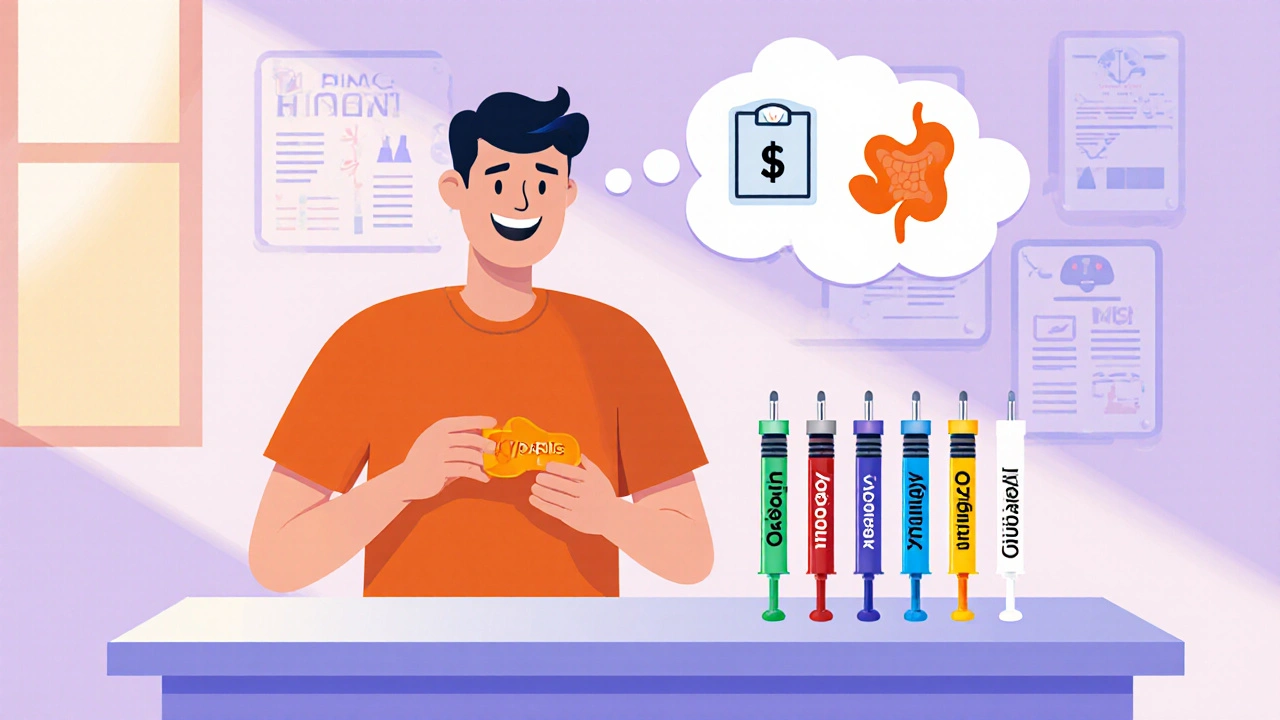Ozempic – Uses, Benefits, and Practical Tips
When talking about Ozempic, the brand name for the injectable GLP‑1 receptor agonist semaglutide. Also known as semaglutide, it is prescribed mainly for type 2 diabetes, helping lower blood sugar and often supporting weight loss. This medication belongs to the GLP‑1 receptor agonist class, which mimics the gut hormone GLP‑1 to boost insulin release, slow gastric emptying, and reduce appetite. Understanding these three core entities—Ozempic, semaglutide, and the GLP‑1 class—sets the stage for a clear picture of why the drug matters for millions of patients.
Ozempic works by binding to the GLP‑1 receptor on pancreatic beta cells. The result is a stronger, glucose‑dependent insulin response, which keeps spikes in check after meals. Because the drug also slows how quickly food leaves the stomach, you feel fuller longer, which is why many users notice steady weight loss. Clinical trials show an average 5‑10% reduction in body weight after a year of treatment, and a significant drop in major cardiovascular events for patients with heart disease. In short, the drug addresses both blood sugar control and weight management, two key challenges in modern diabetes care.
Key Benefits and Considerations
From a practical standpoint, Ozempic is administered once a week via a pre‑filled pen. The once‑weekly schedule is a convenience boost compared with daily injections or multiple oral meds. Dosage starts at 0.25 mg to minimize gastrointestinal side effects, then steps up to 0.5 mg, and can reach 1 mg if needed for optimal glycemic control. Some clinicians even prescribe a 2 mg dose for patients aiming for stronger weight‑loss outcomes, though that requires careful monitoring.
Side effects are usually mild and tend to improve after a few weeks. The most common complaints are nausea, vomiting, and occasional diarrhea. A small percentage of users experience more serious issues like pancreatitis or gallbladder disease, so it’s crucial to discuss any abdominal pain with your doctor promptly. Because Ozempic lowers blood sugar, you’ll also need to watch for hypoglycemia, especially if you’re on insulin or sulfonylureas – adjusting those meds can prevent dangerous lows.
Insurance coverage is another reality check. In many regions, Ozempic qualifies for diabetes medication benefits, but out‑of‑pocket costs can still be high. Patients often explore patient‑assistance programs or compare prices through reputable online pharmacies. Knowing the financial landscape helps you stay on therapy without surprise bills.
Beyond diabetes, doctors are now prescribing Ozempic off‑label for obesity management, thanks to the robust weight‑loss data. The FDA approved a higher‑dose version called Wegovy for chronic weight management, but many clinicians use Ozempic at similar doses for patients who don’t meet strict Wegovy criteria. This overlap highlights how the GLP‑1 class is reshaping treatment paradigms beyond glucose control.
If you’re pregnant, planning pregnancy, or breastfeeding, Ozempic is not recommended due to limited safety data. Likewise, people with a personal or family history of medullary thyroid carcinoma or multiple endocrine neoplasia type 2 should avoid the drug, as animal studies flagged potential risks.
Putting the pieces together, you can see a clear chain of relationships: Ozempic (semaglutide) is a GLP‑1 receptor agonist that treats type 2 diabetes and often aids weight loss, while also reducing cardiovascular risk. The drug’s weekly dosing enhances adherence, and its side‑effect profile requires a gradual dose escalation. These connections help you decide if Ozempic fits your health goals and lifestyle.
Now that you have a solid overview—what Ozempic is, how it works, key benefits, dosing tips, and safety points—you’re ready to dive deeper. Below you’ll find a curated collection of articles that explore specific aspects such as side‑effect management, insurance navigation, real‑world patient experiences, and comparisons with other GLP‑1 drugs. Browse the list to find the exact guidance you need next.

Rybelsus (Semaglutide) vs. Other GLP‑1 Drugs: Complete Comparison
A detailed side‑by‑side review of Rybelsus (semaglutide) versus other GLP‑1 drugs, covering efficacy, safety, cost and how to choose the right option.
